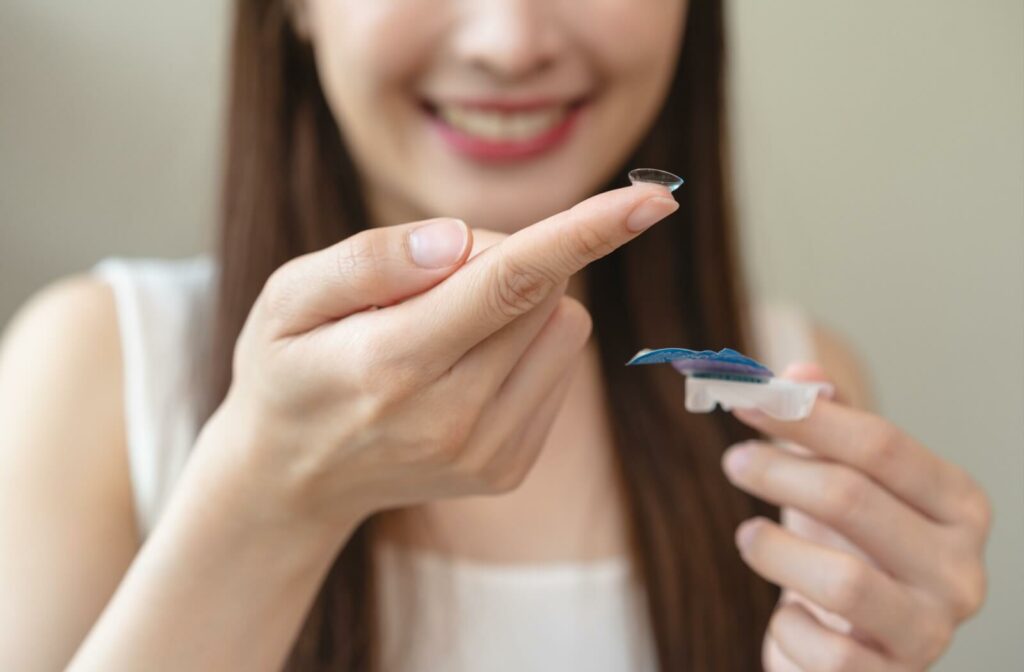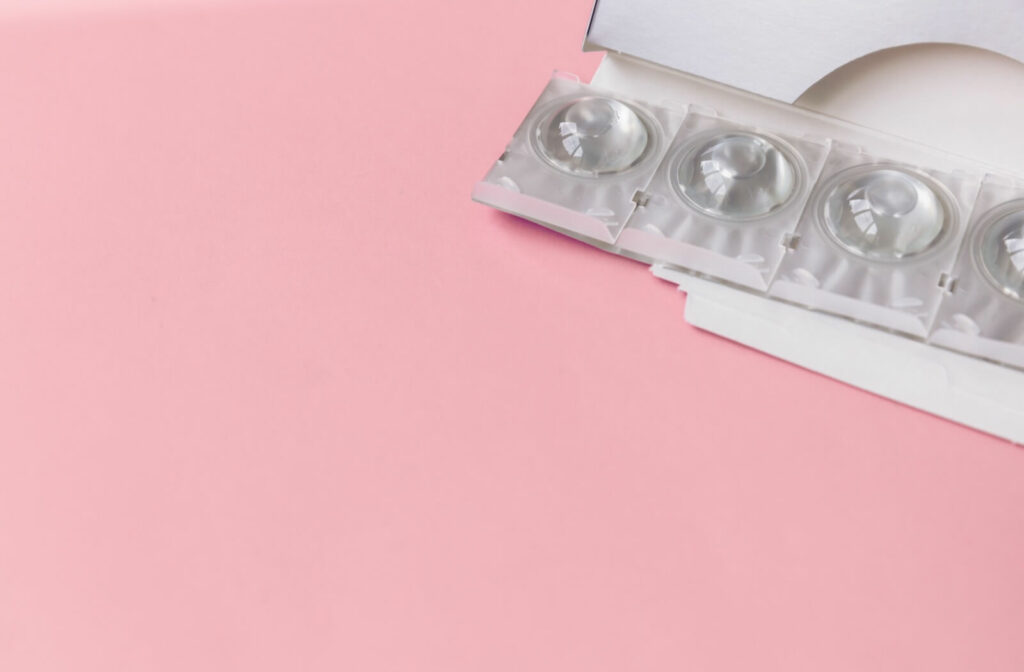Daily disposable contact lenses are one of the most popular choices for vision correction today. Convenient, hygienic, and simple to use, they’re perfect for people on the go.
Daily lenses are thin, delicate, and designed for single-day use for up to 16 hours. They shouldn’t be worn for more than a day.
Reusing a daily disposable lens can cause the lens to tear and degrade. It may also increase the likelihood of bacteria or debris accumulation. Sleeping while wearing contacts not created for overnight wear also reduces oxygen flow to the eye, increasing dryness and irritation, and posing a risk to your eye health.
All About Daily Contact Lenses
Daily disposable contact lenses, or “dailies”, are made from ultra-thin material, making them soft, flexible, and very breathable. Their high moisture content provides a natural “barely there” feel, keeping your eyes healthy and comfortable for all-day wear.
The comfort and convenience offered by soft contacts make them a popular choice for new wearers, children, and those with busy schedules.
- Convenience: Daily lenses come prepackaged in lens solution, making them travel-friendly. You don’t have to worry about wear schedules or cleaning. Just grab a pair and go!
- Comfort: Fresh lenses every day mean less build-up of protein and debris. Starting your day with a new, fresh lens minimizes the risk of eye infections or irritation.
- Great for occasional wearers: If you only wear contacts sparingly, you don’t have to worry about the lenses expiring.
- Suitable for dry eyes: Dailies’ ultra-thin and breathable design provides better moisture retention and adequate hydration than other soft contacts, making them comfortable for those with dry eyes.
Although daily lenses appear similar to reusable contacts, they differ from biweekly and monthly reusable lenses for several reasons:
- Material: Dailies are made of lighter, thinner materials than reusable lenses. This makes them comfortable for single-day use but less durable to reuse later on.
- No maintenance: Dailies require less maintenance than reusable lenses because they are a single-use contact. A fresh, new pair is worn during the day and removed and discarded at the end of the day.
- Hygiene: Failure to properly maintain reusable lenses increases the risk of debris entering the eye and wearing fresh daily lenses significantly reduces this risk.
The Risks of Overwearing Daily Contact Lenses
Daily lenses are safe to wear for 8 to 16 hours, but using them beyond that period is unsafe.
Attempting to overwear or reuse dailies can cause the lenses to tear, creating uneven surfaces which can damage the eye. Plus, they aren’t durable enough to withstand cleaning. After one use, the lenses lose their moisture-retaining properties, becoming dry and uncomfortable. Re-soaking them in lens solution can also cause micro-tears in the lens.
Unless they’re designed for overnight wear, sleeping in your contacts is especially risky, because it limits oxygen flow to your eyes. This creates an ideal environment for bacteria to thrive, significantly increasing the risk of serious eye infections.
Always remove your lenses before sleeping, showering, or swimming, to prevent bacteria accumulation and subsequent irritation or infection.
Wearing your daily lenses beyond their intended use is a form of improper contact lens care, and can lead to several issues:
- Eye infections, such as conjunctivitis or keratitis.
- Dryness and irritation from worn-down lens material.
- Corneal ulcers can develop from bacteria buildup or debris trapped beneath the lens.
- Blurry vision from dryness and deteriorated lens material.
- Reduced oxygen supply to the cornea, leading to long-term complications
If you’re unsure about contact lens care, we’re always here to provide guidance!

Alternatives to Daily Contact Lenses
If dailies aren’t suitable for your lifestyle, there are some great, reusable alternatives:
- Monthly or biweekly lenses: Another popular form of soft contact lenses, these reusable lenses are durable enough to withstand daily cleaning and proper storage, making them safe to wear for 14 or 30 days upon opening. These lenses are great for people who wear contacts more frequently and are comfortable with a maintenance routine.
- Rigid Gas Permeable (RGP) lenses: Also known as hard contacts, RGP lenses provide wearers with crisp, clear vision and are more breathable with soft lenses. With proper care, these lenses can last up to a year, but their durable lens design makes the lenses less flexible than daily lenses, meaning it may take wearers more time to adjust to them.
- Scleral lenses: These specialized hard contact lenses are larger in diameter than traditional lenses, allowing them to vault over the corneal surface. This unique design makes scleral lenses a comfortable option for people with severe dry eyes or irregular corneas, although they require special cleaning techniques.
- Ortho-K lenses: These hard contact lenses are worn overnight to gently reshape the cornea in order to correct vision, eliminating the need for glasses or contacts during the day.
- Backup glasses: No matter how long you’ve been a contact lens wearer, having a backup pair of glasses is always recommended. They give your eyes a much-needed break from contacts, preventing irritation and discomfort from overwearing daily lenses.
The nature of these reusable contacts means they require more maintenance than dailies, including daily cleaning and following strict replacement schedules, to maintain healthy eyes and comfortable vision.
Keep Your Eyes Healthy & Comfortable
Daily lenses offer unparalleled convenience and hygiene, but using them as intended is essential. They should be discarded after a single day’s wear.
If you’re looking to explore which contact lens option is most suitable for your eyes and lifestyle, connect with our Tree City Eyecare team to schedule a contact lens fitting.


